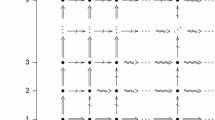Abstract
This paper is devoted to the problem of the existence of affine timings for problems defined by Systems of Affine Recurrence Equations. After a first analysis, such problems may have no affine timing not because the problem is uncomputable but only because of the initial system of equations. This system can induce dependencies organized in an inappropiate way. We give conditions for a dependency to be well-organized in such a way that an affine timing may exist. When a dependency does not satisfy these conditions, we describe how to transform it in order to meet the conditions. A problem defined by a system of equations is analyzed by a step-by-step examination of its dependencies. For each dependency organized in an inappropriate way, a transformation is applied. The whole transformation process yields to the determination of a new equivalent system of equations from which an affine timing can usually be computed. Many practical problems need such transformations. We illustrate this transformation process on the Algebraic Path Problem.
This work has been supported by the Laboratoire d’Informatique de Besançon and by the French Coordinated Research Program C3 of the CNRS.
Access this chapter
Tax calculation will be finalised at checkout
Purchases are for personal use only
Preview
Unable to display preview. Download preview PDF.
Similar content being viewed by others
Bibliography
Benaini A., Quinton P., Robert Y., Saouter Y., Tourancheau B. — Synthesis of a new Systolic Architecture for the Algebraic Path Problem, IRISA Research Report, No 1094,1989.
Clauss Ph., Perrin G.R. — Synthesis of Process Arrays, CONPAR’88, Manchester, G.B,1988.
Delosme J.M., Ipsen I.C.F. — An Illustration of a Methodology for the Construction of Efficient Systolic Architectures in VLSI, Sd. Int. Symposium on VSLI Technology, Systems and Applications, Taipei, Taiwan, R.O.C.,1985, p. 268–273.
Delosme J.M. — A Parallel Algorithm for the Algebraic Path Problem, Int. Workshop on Parallel and Distributed Algorithms, M. Cosnard et al. editors, North-Holland,1988.
Fortes J.A.B., Fu K.S., Wah B.W. — Systematic Approaches to the Design of Algorithmically Specified Systolic Arrays, Int. Conf. on Acoustics, Speech and Signal Processing,1987.
Karp R.M., Miller R.E., Winograd S.— The Organization of Computations for Uniform Recurrence Equations, JACM,t. 14,3, 1967.
Kung H.T. — Why systolic architectures ?, Computer, t. 15–1, 1982, p. 37–46.
Mongenet C., Clauss Ph., Perrin G.R.— Geometrical Tools to map Systems of Affine Recurrence Equations on Regular Arrays, Research Report, LIB, Université de Franche-Comté,1990.
Mongenet C., Clauss Ph., Perrin G.R. — A Geometrical Cding to Compile Affine Recurrence Equations on Regular Arrays, Fifth Int. Parallel Processing Symposium, Anaheim, California,1991.
Moldovan D.I., Fortes J.A.B. — Partitioning and Mapping Algorithms into Fixed Size Systolic Arrays, IEEE Transactions on Computers,t. 35–1, 1986, p. 1–12.
Moldovan D.I. — On the Design of Algorithms for VLSI Systolic Arrays, Proc IEEE conf.,t. 71–1, 1983, p. 113–120.
Mongenet C. — Une Méthode de Conception d’Algorithmes Systoliques, Résultats Théoriques et réalisation, Thèse INPL, Nancy,1985.
Mongenet C., Perrin G.R. — Synthesis of Systolic Arrays for Inductive Problems, Conf. PARLE, LNCS 259,1987.
Quinton. P. — Automatic Synthesis of Systolic Arrays from Uniform Recurrence Equations, Proc. IEEE 11th Int. Symp. on Computer Architecture, Ann Arbor, MI, USA,1984, p. 208–214.
Quinton P., Van Dongen V. — The Mapping of Linear Recurrence Equations on Regular Arrays, The Journal of VLSI Signal Processing,t. 1,1989, p. 95–113.
Robert Y., Trystram D. — Systolic Solution of the Algebraic Problem, Int. Workshop on Systolic Arrays, Oxford, Adam-Hilger,1987, p. 171–180.
Saouter Y., Quinton P. — Computability of Recurrence Equations, TR-1203, IRISA, Rennes,1990.
Yaacobi Y., Cappello P.R. — Scheduling a System of Affine Recurrence Equations onto a Systolic Array, Int. Conf. on Systolic Arrays, San Diego, USA,1988, p. 373–382.
Author information
Authors and Affiliations
Editor information
Editors and Affiliations
Rights and permissions
Copyright information
© 1991 Springer-Verlag Berlin Heidelberg
About this paper
Cite this paper
Mongenet, C. (1991). Affine Timings for Systems of Affine Recurrence Equations. In: Aarts, E.H.L., van Leeuwen, J., Rem, M. (eds) Parle ’91 Parallel Architectures and Languages Europe. Lecture Notes in Computer Science, vol 505. Springer, Berlin, Heidelberg. https://doi.org/10.1007/978-3-662-25209-3_17
Download citation
DOI: https://doi.org/10.1007/978-3-662-25209-3_17
Publisher Name: Springer, Berlin, Heidelberg
Print ISBN: 978-3-662-23206-4
Online ISBN: 978-3-662-25209-3
eBook Packages: Springer Book Archive



